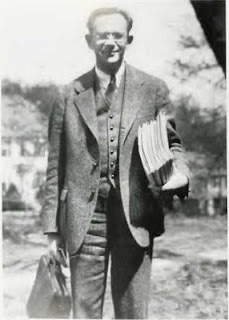Edward Sapir is a German-born American linguist, anthropologist, and essayist.
Profile
- Birth Name: Edward Sapir
- Date of Birth: January 26, 1884
- Place of Birth: Lauenburg, Pomerania, Germany
- Date of Death: February 4, 1939
- Place of Death: New Haven, New Haven County, Connecticut, USA
- Cause of Death: Stroke
- Interred at: Sapir Family Cemetery, Alton, Belknap County, New Hampshire, USA
- Zodiac Sign: Aquarius
- Nationality: American
- Ethnicity: White
- Religion: Jewish
- Father: Jacob David Sapir (1861-1931)
- Mother: Eva Sapir née Seagal (1863-1938)
- Siblings: Max Sapir
- Spouse(s):
- Florence Delson (b. 1889 d. 1924 m. 1910 to until her death)
- Jean Victoria McClenaghan Sapir (b. 1899 d. 1977 m. 1926 to until his death)
- Children (from first marriage):
- Son - Herbert Michael Sapir(1913)
- Daughter- Helen Ruth Larson(1914)
- Son - Philip Sapir
- Children (from second marriage):
- Son - Paul Edward Sapir
- Son - J. David Sapir
- Alma Mater: Columbia University
- Edward Sapir is known for: Classification of Native American languages; postulation of Linguistic Relativity or Sapir–Whorf hypothesis; ethnolinguistics; development of modern concept of the phoneme.
- Edward Sapir is criticized for: NA
- Edward Sapir was influenced by: Franz Boas
- Edward Sapir influenced: Morris Swadesh, Li Fanggui, Benjamin Whorf, Mary Haas, Harry Hoijer, Zellig S. Harris, G. L. Trager, and Charles F. Voegelin.
Quotes
“Were a language ever completely "grammatical" it would be a perfect engine of conceptual expression. Unfortunately, or luckily, no language is tyrannically consistent. All grammars leak.” ― Edward Sapir, Language (1921) p. 39Major Works
- Time Perspective in Aboriginal American Culture: A Study in Method (1916)
- Language (1921)
Did You Know?
- Edward Sapir was born into a Lithuanian Jewish family.
- His parents emigrated to United States in 1890 when he was only five years old.
- In the United States his family first started living in Richmond, Virginia and then shifted to Lower East Side of New York City.
- At the age of fourteen, Sapir won a prestigious Pulitzer scholarship in recognition of his aptitude for academics and languages.
- After attending Columbia University from 1900-1904 on the previously attained Pulitzer scholarship, Sapir graduated in 1904 with a B.A. in linguistics.
- In 1905, with Dr. Boas' encouragement, Sapir completed an M.A. in German.
- Sapir spent 1907-1908 as a research associate at the University of California at Berkeley.
- He earned his Ph.D. in anthropology in 1909, with a dissertation on the Takelma language of southwestern Oregon.
- In 1910, he was appointed director of anthropology in the Geological Survey of the Canadian National Museum, a post he held until 1924.
- His younger brother Max died of Typhoid.
- Sapir’s parents divorced in 1910.
- Before going to Canada, Sapir had a short affair with the Anthropologist Margaret Mead.
- In 1910 Sapir espoused Florence Delson, a distant cousin, who also had Lithuanian Jewish roots.
- Florence had long been suffered from both physical and mental illness and she died in 1924.
- After Florence’s death Sapir started to raise his three children alone. However, eventually, his mother aided him in raising the children.
- He opted to write poetry, compose music, and study psychology to overcome depression ensued from his wife’s demise.
- In 1925 Sapir accepted the invitation to join the department of anthropology at the University of Chicago.
- In 1926 he was married again, to Jean McClenaghan who was sixteen years younger than Sapir.
- From the second marriage Sapir had two children.
- In 1931, he accepted an offer to become Sterling Professor of Anthropology and Linguistics at Yale University.
- His son, J. David Sapir, is a linguist, anthropologist specializing in West African Languages, especially Jola languages. He is Emeritus professor of Anthropology at the University of Virginia. Besides, he is also a photographer.
- Edward Sapir died at the age of fifty five of stroke.




No comments:
Post a Comment